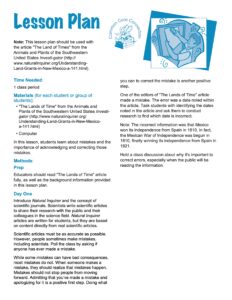The Lands of Time: Understanding Land Grants in New Mexico

National forests and national grasslands are managed for all United States citizens. Parts of these forests and grasslands, however, may be leased to individuals and companies. Some individuals and companies lease public land to graze sheep and cattle. The scientists in this study wanted to understand the Forest Service’s position about the land grants. They were also interested in understanding the Hispanic descendants who want to regain their ancestors’ land grants.

Part Of
Animals and Ecosystems of the Southwestern United States Investi-gator (Rocky Mountain Research Station) - Vol. 3 No. 1
Explore Full Journal-
 The question you will answer in this FACTivity is: How is the current situation in the southern African nation of Botswana similar to and different from the historic land grant...
The question you will answer in this FACTivity is: How is the current situation in the southern African nation of Botswana similar to and different from the historic land grant...FACTivity – The Lands of Time
The question you will answer in this FACTivity is: How is the current situation in the southern African nation of Botswana similar to and different from the historic land grant...
Glossary
View All Glossary-

Carol Raish
Some of my favorite science experiences are listening to older people talk about the way things were in the past when they were young. I also love to travel to...View Profile -

Alice McSweeney
My favorite science experience is talking with ranchers to learn how they teach their children about the land and animals. I also love working on my family’s guest ranch in...View Profile
Standards addressed in this Article:
Social Studies Standards
- Civic Ideals and Practices
- Culture
- Global Connections
- Individuals, Groups, and Institutions
- People, Places, and Environments
- Power, Authority, and Governance
- Time, Continuity, and Change
About Investi-gator
The Investi-gator is another member of the Natural Inquirer family. The Natural Inquirer, for middle school students, and the Investi-gator, for upper elementary students, present science the way scientists most often share their research with each other. That process is the written scientific paper. Each Investi-gator article presents research conducted by Forest Service scientists and their cooperators. All the research in the Investi-gator is concerned with nature or with society’s relationship to nature.
-
Meet the Scientist
An introduction to the scientist or scientists who conducted the research.
-
Thinking About Science
A short introduction to something about the scientific process that is related to the research being presented.
-
Thinking About the Environment
A short introduction to something about the natural environment that is related to the research being presented.
-
Introduction
The part of the written scientific paper that introduces the scientific problem or question the scientists wants to solve or answer.
-
Method
The part of the written scientific paper that describes how the scientists collected and analyzed their data or information.
-
Findings
The part of the written scientific paper that describes what the scientists discovered.
-
Discussion
The part of the written scientific paper that summarizes the research and offers any new insights.
-
Reflection Section
These are questions placed after the Introduction, Methods, Findings, and Discussion sections. The purpose of the questions is to help students think about what they have read.
-
Glossary
Possible new terms you will find in the article. Glossary words are printed in bold in the article.
-
FACTivity
This is an activity that you can do in your classroom.
Lessons
-
 In this lesson, students learn about mistakes and the importance of acknowledging and correcting those mistakes. This lesson plan is designed to be paired with “The Lands of Time” from...
In this lesson, students learn about mistakes and the importance of acknowledging and correcting those mistakes. This lesson plan is designed to be paired with “The Lands of Time” from...Lesson Plan – Everybody Makes Mistakes
In this lesson, students learn about mistakes and the importance of acknowledging and correcting those mistakes. This lesson plan is designed to be paired with “The Lands of Time” from...
Education Files
Project Learning Tree
If you are a trained Project Learning Tree educator, you may use Activity #32 “A Forest of Many Uses,” Activity #50 “400-Acre Wood,” or Activity #56 “We Can Work It Out” as additional resources.




